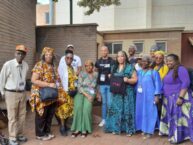
Zimbabwean artists, particularly writers, have been skeptical of wills and this has led to the mismanagement or utter neglect of their artistic estates when they pass on. While families of deceased artists may largely carry the blame for not raising a brow, artists need also to take responsibility of their creative works as these constitute wealth in other terms.
A large number of local writers have died and their contribution to literature is remarkably great yet they have had their legacies dwarfed either by the commerce of the publishing industry or by family apathy. Their unpublished works are forgotten somewhere in a relative’s home or their royalties, in some cases, which must benefit the surviving spouse or children, have no one to claim from the publishers.
At a Zimbabwe Writers Association meeting held in Harare last week to titled “Writers’ Families Reminisce”, participants supported the need for writers to write wills before they die. They noted with concern that family support is vital to ensure continuation of a deceased author’s writing vision.
Much of the discussion on writers’ wills was hinged on part of a presentation made by Lexta Mafumhe Mutasa who briefly gave an account of his family’s attitude towards setting up a Trust in honor of his father, the late writer Nobert Mafumhe Mutasa who died in 2004.
Lexta, who is also a poet, writer and gifted Shona ‘linguist’, said when his father died he left no will and therefore his creative unpublished works remained scattered within his family and up to now, no one has taken the initiative to gather them for possible publication.
“Most of the family members and relatives like to associate with the popularity of the name Mutasa but only a few have actually read his works or think about keeping his legacy in different ways. Much of the blame is on us the family,” said Lexta.
Mutasa, who died a polygamist with eight wives and about fifty two children, penned eleven books including the old world trilogy ‘Mapatya’, ‘Runako Munjodzi’ and ‘Hondo Huru’. Some of his books were popular as Shona literature study material at school.
Mutasa’s immense contribution to Zimbabwean literature was visible in ‘the golden ages’ of the Shona novel, during which period also emerged the first generation of black Zimbabwean writers.Although it’s sad that his family, aware of such greatness of their father, has detached itself from his writing legacy, Lexta said he is determined to carry it forward.
“When my father died, he already knew that I was to follow in his footsteps,” said Lexta whose gift of Shona language was demonstrated when he featured in a local TV soap called ‘Tiriparwendo’ a few years ago. He also was a script writer for the local soap Studio 263 with about 500 episodes penned by him.
“My father would even publicly say that I am the one whom he wanted to carry on with his writing legacy but this is not in a will,” said Lexta.
Asked by Chirere what he foresees and his advice to other living writers, Lexta said he also needed advice on how to set up a Trust which could help organize Mutasa’s unpublished works and speak with one voice in matters regarding his writing. This, he said, would also influence living writers to take responsibility of their works beyond death.
The eleventh book by Mutasa was a Shona children’s story titled ‘Kushereketa Kwepwere Nemapere’ which Lexta said he helped his father translate into English and it was published by Zimbabwe Publishing House (ZPH) as ‘The Dangerous Journey’ in 2000.
As an artist in his own right, Lexta said he is haunted by his father’s shadow as he cannot separate himself from the great name Mutasa.
 “I am a very haunted artist. I cannot escape the shadow of my father just like children of late great musicians who have embarked on music. They cannot hold a show without playing their father’s music, otherwise it will be no show,” said Lexta, giving examples of the Dembos and Chimbetus whose fathers (Leonard Dembo and Simon Chimbetu) are known musical greats in Zimbabwe.
“I am a very haunted artist. I cannot escape the shadow of my father just like children of late great musicians who have embarked on music. They cannot hold a show without playing their father’s music, otherwise it will be no show,” said Lexta, giving examples of the Dembos and Chimbetus whose fathers (Leonard Dembo and Simon Chimbetu) are known musical greats in Zimbabwe.
While family trusts could pose an answer to the ‘writers’ trouble in paradise” as Lexta described it, and may ease the tension of negotiating with publishers for royalties, they (the trusts) can only stand through family, corporate and national support.
Family trusts play a pivotal role in keeping a deceased writer’s legacy as, for example, the successful Yvonne Vera Award, which is held annually by the family in partnership with the Intwasa Arts Festival to honor the late Bulawayo-born writer Yvonne Vera.
The Dambudzo Marechera Trust, formed in 1988 to carry out various activities in honor of legendary writer Dambudzo Marechera, has in the past assisted in the posthumous publication of his works such as ‘Cemetery of Mind’ (1992) and ‘Scrapiron Blues’ (1992). The Trust is in the process of revival following the exit of other Trustees who are now based abroad.
In 2010, speaking at a tombstone unveiling ceremony to honor the late writer and cultural guru Solomon Mutsvairo, the then Deputy Minister of Sports, Arts and Culture Lazarus Dokora called for the formation of the Prof Mutsvairo Foundation or Fund which would facilitate bursaries, scholarships and grants to deserving pupils and students yet until today, little has been done to honor Mutsvairo.

Musaemura Zimunya who attended the writers’ meeting said in the absence of a Trust or authentic heir to the deceased writer’s estate, the situation is worsened as it gives oxygen for corruption. One publisher who confided in Zimunya told him that ‘writers are their worst enemies’ in the sense that they do not leave wills when they die.
“Zimbabwe at the very moment is awash with conmen and some conmen (who are at times employees in the publishing houses) connive with children of the deceased to get royalties from publishers without the knowledge of the deserving heirs,” said Zimunya, adding that family conventions involving spouses of the deceased need to be held to resolve family differences.





